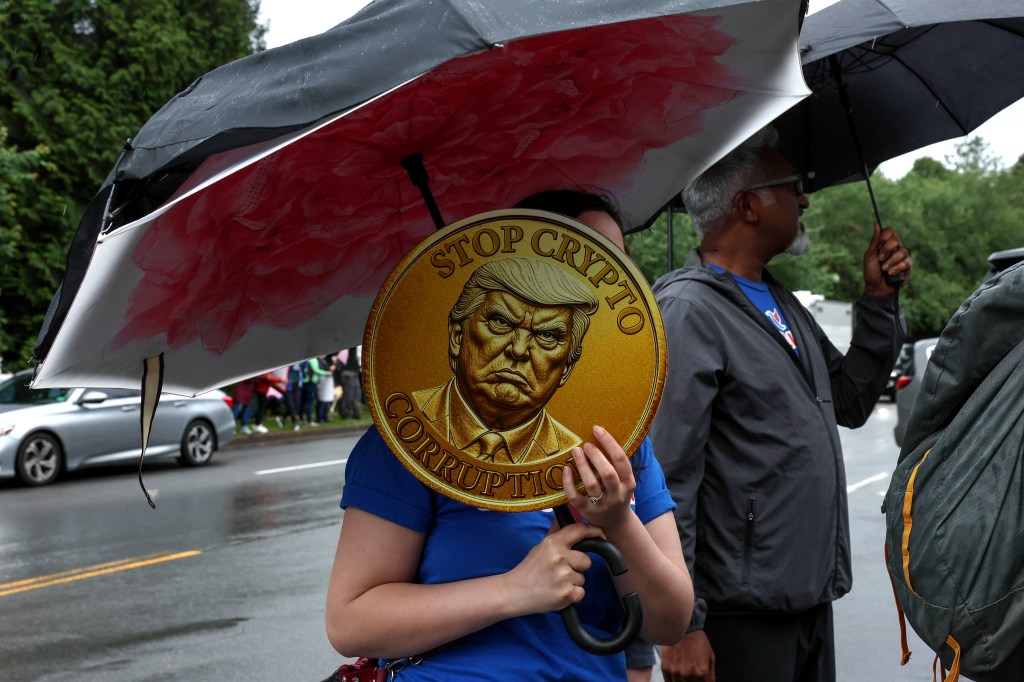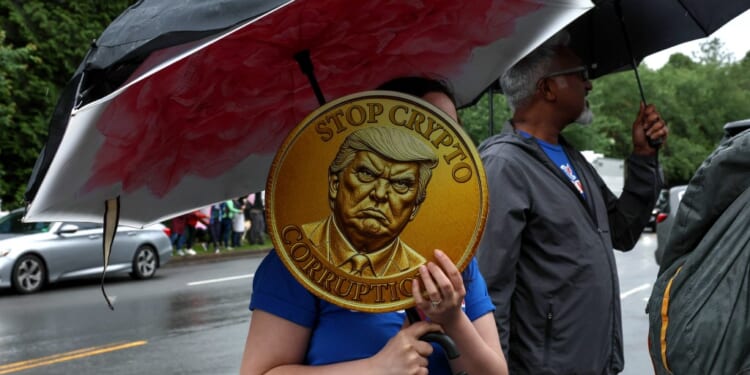
Cryptocurrencies are digital-first tokens whose ownership is marked on collective, highly secure digital ledgers, called blockchains. This has mainly been used to speculate, gamble, and scam, but—with the proper regulatory framework—advocates argue that technologies like decentralized finance (DeFi) platforms and cryptocurrencies could become instrumental parts of mainstream finance, reducing many of the transaction fees and delays associated with traditional finance.
The current Trump administration’s broad embrace of and support for the crypto industry depart substantially from both the Biden administration’s approach and Trump’s earlier public views on cryptocurrency. Back in 2021, Trump called Bitcoin “a scam” and said it should be highly regulated to prevent it from competing with the U.S. dollar. But by the end of 2022, Trump began to change his tone on the emerging technology, even releasing a line of blockchain-powered digital trading cards featuring his own image. By the kickoff of his 2024 campaign for president, Trump was calling himself the “crypto president” and promising the industry that, if elected, he would appoint pro-crypto regulators to key agencies, such as the Commodities and Futures Trading Commission (CFTC) and the Securities and Exchange Commission (SEC).
Meanwhile, the Biden administration was taking a more hostile stance. Instead of pursuing regulatory reform and offering crypto firms reliable guidance on how to operate legally within existing securities law, under Biden, the SEC and DOJ pursued an aggressive prosecutorial strategy, launching investigations into exchanges like Binance, Kraken, Coinbase, and FTX for suspected violations of securities and anti-money laundering laws. The approach, which critics labeled “regulation by prosecution,” put the industry on the defensive, limiting the growth of new firms and discouraging traditional banks and financial institutions from adopting blockchain technology and products. It also encouraged many in the industry, fearing four more years of a Biden or Harris presidency, to go all in on the Trump campaign, which pitched a comparatively laissez-faire approach. While the industry’s top political action committees did not donate directly to either presidential candidate in 2024, they spent around $135 million supporting pro-crypto congressional candidates, and several high-profile crypto founders personally supported Trump’s campaign.
Since taking office in January, Trump has largely kept his promises to the industry. During his first week, Trump issued an executive order outlining his administration’s intentions to “promote United States leadership in digital assets and financial technology while protecting economic liberty.” In March, he issued a second executive order establishing a “Strategic Bitcoin Reserve” and a “U.S. Digital Asset Stockpile.”
In July, Trump also signed into law the GENIUS Act, a largely bipartisan bill regulating stablecoins—a form of cryptocurrency designed to maintain a 1-to-1 value with an asset like the U.S. dollar—and the first major crypto legislation in American history. Legislators immediately pivoted to what is considered within the crypto industry to be the most substantial legislative project yet—a so-called “market structure,” which will determine the basic regulatory framework for the entire crypto industry. Until now it has relied on antiquated securities laws passed nearly a century ago and commodity frameworks implemented in the 1970s.
“It’s the foundational regulatory framework for how digital assets are going to reach the American people,” Cody Carbone, chief executive officer of the Digital Chamber, a blockchain and digital asset trade association, told TMD. “It’s so critical that we start here and get this, this is the low-hanging fruit.”
Despite the industry’s boom under Trump, crypto firms and traditional financial institutions still face broad legal uncertainty about how to offer digital assets to their customers, which curtails their ability to plan confidently. But if the U.S. can pass a market structure bill clarifying how—and by whom—the crypto industry is regulated, institutional players like commercial banks will finally have the formal go-ahead they need to begin offering crypto custody, trading, and payment services to their customers. “Having that kind of clarity legally from legislation is gonna be huge, and it’s gonna be a huge boon for a lot of financial institutions and investors who want to get more into the space,” Ron Hammond, head of policy and advocacy at the cryptocurrency trading firm Wintermute, told TMD.
That clarity is coming. Last week, the Senate Agriculture Committee, which oversees the CFTC, released a discussion draft of its long-awaited version of the bill that, if passed, would open the door to broader adoption of blockchain technology across the American economy.
But critics remain concerned. “The bill is long on promises and very short on details,” Mark Hays, associate director for cryptocurrency and financial technology at Americans for Financial Reform, told TMD. “If this legislation passes without adequate safeguards for investors and with loopholes that could undermine existing financial regulations, when the next crypto crash comes—and it will come—more of us, even if we don’t invest in crypto, could be negatively impacted.”
That possibility has some on Capitol Hill, particularly in Democratic offices, on edge. But a larger issue for many Democrats is the conflict-of-interest concerns surrounding the Trump family, whose wealth is now, in no small part, tied directly to the fortunes of crypto in America.
Alongside an official memecoin issued by Trump only days before his second inauguration, a Bitcoin treasury announced by the president’s Trump Media & Technology Group, and various cryptocurrency mining projects pursued by the president’s sons, the family is the majority owner of World Liberty Financial. The crypto firm, formed by allies of the president, last year launched a cryptocurrency token that raised more than $500 million in its first several months of sales—which benefited the Trump family directly through its right to 75 percent of the token’s trading fees. In February, the SEC paused a yearslong prosecution against crypto billionaire Justin Sun, only a few months after he purchased around $75 million worth of the token, leading to the first in a string of quid pro quo allegations from opponents of the president.
In March, World Liberty Financial also announced the launch of $USD1, a stablecoin pegged to the U.S. dollar and a potential cash cow for the business should it attract broad investment. Two months later, an Emirati state-owned investment firm used the stablecoin to make a $2 billion investment in the crypto exchange Binance, granting the Trump family’s stablecoin legitimacy and providing World Liberty Financial with a substantial nest egg that could generate tens of millions of dollars per year in interest for the Trump family. Simultaneously, Binance founder and former CEO Changpeng Zhao, who pleaded guilty in 2023 to charges of violating the Bank Secrecy Act, began a monthlong lobbying campaign for a pardon from the White House—which he received late last month. The pardon riled up Democrats, including Senate Banking Committee Elizabeth Warren, the ranking member, who saw the move as a conflict of interest and potential quid pro quo from the Trump administration.
Some Democrats are trying to introduce conflict-of-interest provisions into the market structure bill that would prevent the kind of deep industry involvement undertaken by the current White House, but it seems like a long shot. “Who in their right mind believes that the Trump administration is going to sign off on a regulatory framework for an industry that has literally made him billions and that would make that more difficult for him to do?” Hays said.
Crypto lobbyists and legislative staffers also face a time crunch. As the industry faces increasing polarization, its proponents want to avoid stretching the legislative process into 2026, when midterm elections could further politicize the issue. “Can we get a bill across the finish line and to the president’s desk before it becomes a really political season?” Carbone asked. He thinks so, though it won’t be easy. “Even during the shutdown, you were having industry roundtables with both Republicans and Democrats,” Carbone said. “This still remains a priority for these members.”
Industry insiders are hoping to see draft bills marked up by the end of the year, followed by a full Senate vote in February or March. Then the bill will head to the House, and eventually, the industry hopes, to the president’s desk. After that, it will be up to crypto firms, traditional banking institutions, and U.S. consumers to shape the future of America’s digital economy and, most importantly, determine what global leadership in digital assets looks like.
“The United States is a world leader in global markets, but if we fail to act, we’re going to keep seeing more folks go offshore, and that’s going to be a concern, especially when we’re trying to retain the industry’s and the country’s best and brightest,” Hammond said. “This is the time to get it done, and there’s momentum, which is rare in politics.”

















